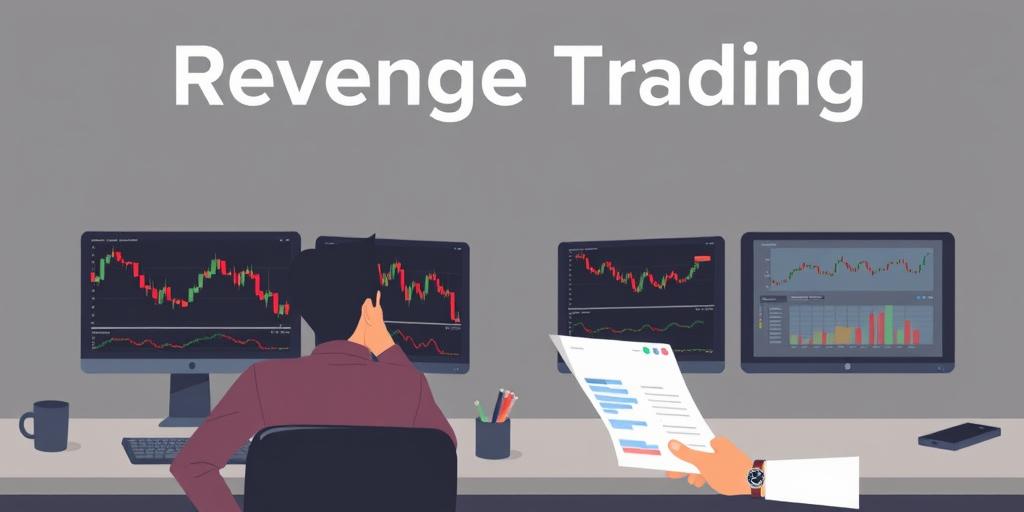Overcoming Revenge Trading: How to Stop Chasing Losses and Protect Your Capital
Revenge trading is a destructive pattern where traders attempt to quickly recover losses by taking on excessive risk. This often leads to even greater losses and significant emotional distress. Understanding the psychology behind revenge trading and implementing strategies to manage it are crucial for protecting your capital and maintaining a disciplined approach to trading.
Understanding Revenge Trading
Revenge trading is driven by the emotional response to losing trades. Instead of accepting the loss as part of the trading process, traders may feel an overwhelming urge to recoup their money immediately. This can lead to impulsive decisions, such as increasing position sizes, abandoning established trading plans, and entering trades without proper analysis.
The Psychology Behind Revenge Trading
Several psychological factors contribute to revenge trading:
- Loss Aversion: The pain of losing money is often felt more strongly than the pleasure of gaining an equivalent amount.
- Ego: Traders may see losses as a personal failure, leading them to seek immediate validation through winning trades.
- Impatience: The desire for instant gratification can override rational decision-making.
- Fear of Missing Out (FOMO): Seeing others succeed can pressure traders to take on risky trades in an attempt to catch up.
Identifying Revenge Trading Behavior
Recognizing the signs of revenge trading is the first step toward overcoming it. Common indicators include:
- Trading Without a Plan: Entering trades impulsively, without adhering to a pre-defined strategy.
- Increasing Position Sizes: Taking on larger positions than usual in an attempt to quickly recover losses.
- Ignoring Risk Management: Disregarding stop-loss orders and other risk management techniques.
- Emotional Distress: Feeling anxious, angry, or frustrated while trading.
- Chasing Losses: Continuously entering new trades in an attempt to recover previous losses.
Strategies to Stop Chasing Losses
Implementing effective strategies can help traders break the cycle of revenge trading and protect their capital:
- Acknowledge and Accept Losses:
- Recognize that losses are a natural part of trading.
- Avoid dwelling on past mistakes; instead, focus on learning from them.
- Accepting losses can reduce the emotional intensity that drives revenge trading.
- Develop a Trading Plan:
- Create a comprehensive trading plan that outlines your goals, risk tolerance, and trading strategy.
- Stick to your plan, even when faced with losses.
- A well-defined plan can provide a framework for making rational decisions.
- Implement Strict Risk Management:
- Use stop-loss orders to limit potential losses on each trade.
- Determine an appropriate position size based on your risk tolerance.
- Never risk more than you can afford to lose.
- Take Breaks:
- If you find yourself becoming emotional, step away from your trading platform.
- Engage in activities that help you relax and clear your mind.
- Returning to trading with a fresh perspective can prevent impulsive decisions.
- Review and Analyze Trades:
- Regularly review your trading performance to identify patterns and areas for improvement.
- Analyze both winning and losing trades to understand what went right and what went wrong.
- Use this information to refine your trading strategy and risk management techniques.
- Seek Support:
- Talk to other traders or a trading coach about your experiences.
- Sharing your struggles can provide valuable insights and support.
- A mentor can offer guidance and help you develop strategies to manage your emotions.
- Practice Mindfulness:
- Engage in mindfulness techniques, such as meditation, to improve your emotional regulation.
- Mindfulness can help you become more aware of your thoughts and feelings, allowing you to make more rational decisions.
The Importance of Emotional Discipline
Emotional discipline is a cornerstone of successful trading. By developing self-awareness and implementing strategies to manage your emotions, you can avoid the pitfalls of revenge trading and protect your capital. Remember, trading is a marathon, not a sprint. Patience, discipline, and a well-thought-out plan are essential for long-term success.
Conclusion
Overcoming revenge trading requires a combination of self-awareness, emotional control, and disciplined risk management. By understanding the psychology behind revenge trading and implementing the strategies outlined above, you can break the cycle of chasing losses and protect your capital. Stay focused on your long-term goals, and remember that every trade is an opportunity to learn and improve.









